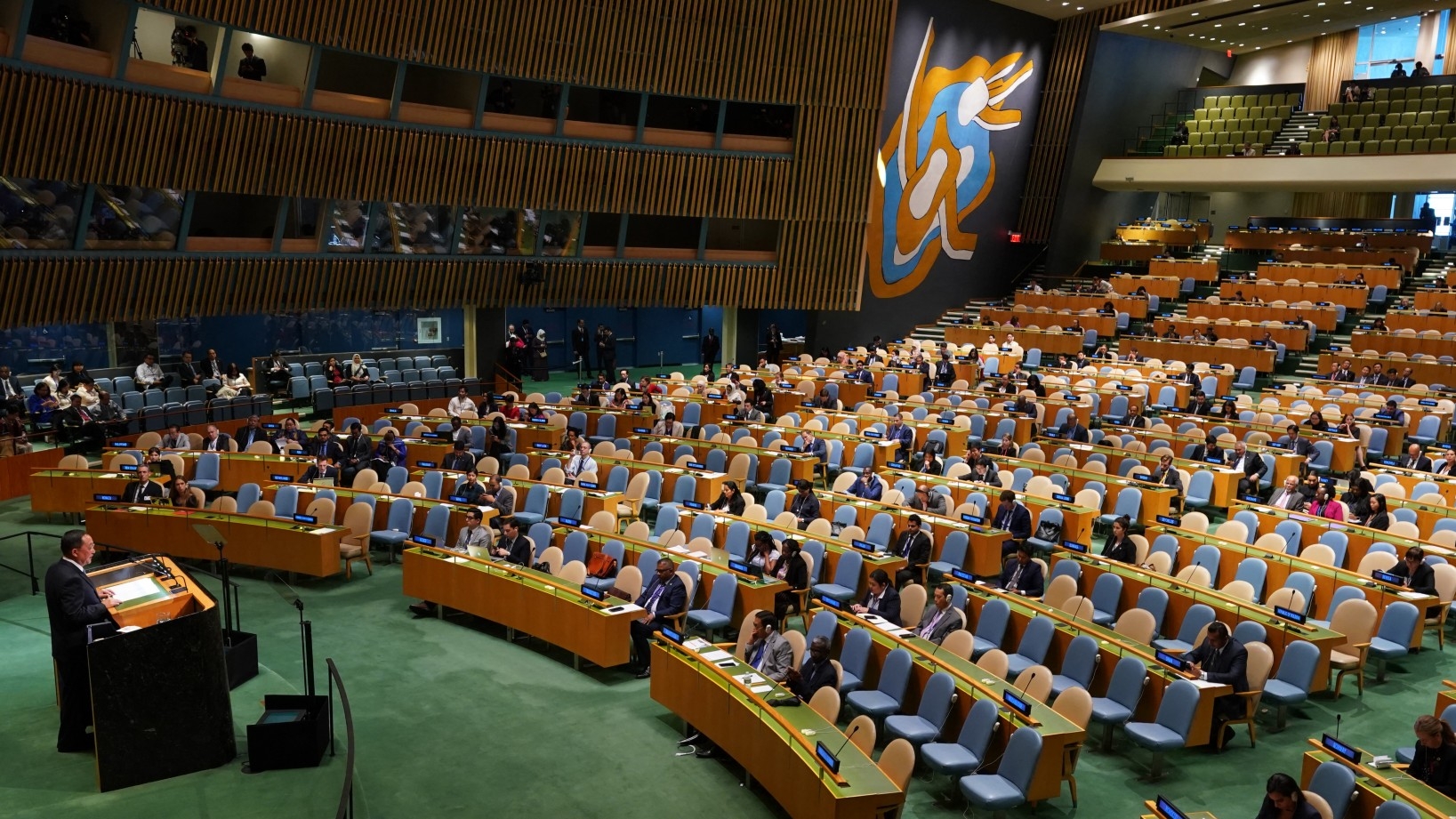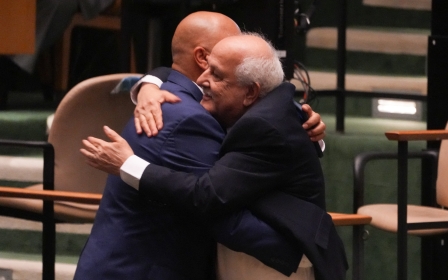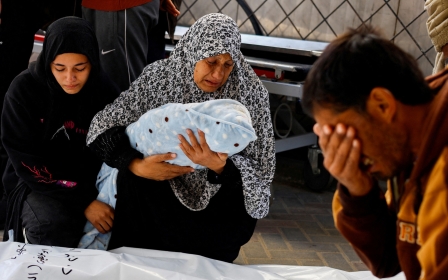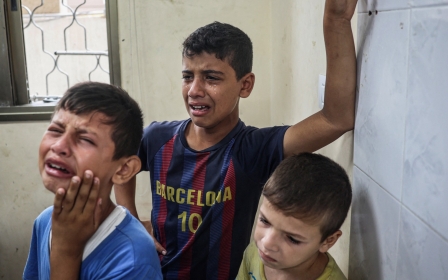UN General Assembly 2024: Which Middle East leaders are speaking and when?

World leaders are gathering in New York this week for the annual United Nations General Assembly general debate, and the agenda among heads of state from the Middle East is likely to be focused on Israel's war on Gaza and the latest Israeli escalatory attacks on Lebanon.
No gathering in world politics attracts more heavyweights during its first week.
On Tuesday, US President Joe Biden made his final appearance at the yearly summit as he will be ending his mandate this year.
The Democrat sought to lay out his foreign policy accomplishments despite the devastation in Gaza and the growing threat of Israel invading Lebanon.
The General Assembly is a core component of the UN with manifold duties, including overseeing voting for new members, choosing non-permanent members of the UN Security Council and playing a part in electing the UN secretary general.
New MEE newsletter: Jerusalem Dispatch
Sign up to get the latest insights and analysis on Israel-Palestine, alongside Turkey Unpacked and other MEE newsletters
It also gives observer status to non-member states and blocs including Palestine and the European Union, whose speakers can address the assembly.
What's happening this week?
The theme for this year's General Assembly debate is: "Leaving no one behind: acting together for the advancement of peace, sustainable development and human dignity for present and future generations".
But don't expect world leaders to stick to the theme. Most leaders from across the Middle East will promote whatever international issue is at the top of the agenda for their country.
Many speakers will not stick to the allotted 15-minute time slot. Frequently they go over that time limit, although no one will likely beat the performance of the late Cuban leader, Fidel Castro, who clocked up an impressive four hours in September 1960.
What's the schedule?
Morning debating sessions run from 9 am EST (that's four hours behind GMT) until 2:45pm. The afternoon session begins at 3pm and ends at 9pm. You can catch live coverage here. An archive of speeches so far this week is being updated onto the United Nations website and a full list of speakers will be updated here.
World leaders have complicated lives, so the running order below may change, especially if, as mentioned above, speakers go over their time.
The position in brackets refers to where in the order of each session the speaker is due to take to the podium.
Tuesday 24 September
Full coverage of speeches, including video.
Morning (9am EST - 2:45pm EST)
- President Joe Biden, US (2nd)
- President Recep Tayyip Erdogan, Turkey (3rd)
- King Abdullah II, Jordan (4th)
- Sheikh Tamim bin Hamad al-Thani, emir of Qatar (8th)
- President Cyril Ramaphosa, South Africa (9th)
- President Mohamed Muizzu, Maldives (10)
Afternoon (3pm EST - 9pm EST)
- President Mohamed Ould Cheikh El Ghazouani, Mauritania (1st)
- President Sadyr Zhaparov, Kyrgyzstan (2nd)
- President Masoud Pezeshkian, Iran (5th)
- Prince Salman bin Hamad al-Khalifa, Bahrain (15)
- Prime Minister Aziz Akhannouch, Morocco (18)
Wednesday 25 September
Full coverage of speeches, including video.
Morning (9am EST - 2:45pm EST)
- President of the Libyan Presidential Council, Mohamed Menfi (12)
- President Emmanuel Macron, France (19)
Afternoon (3pm EST - 9pm EST)
- President Pedro Sanchez Perez-Castejon, Spain (13)
- Minister of the People's Power for Foreign Affairs of Venezuela, Yvan Gil Pinto (16)
Thursday 26 September
Full coverage of speeches, including video.
Morning (9am EST - 2:45pm EST)
- President Mahmoud Abbas, State of Palestine (6th)
- President of the Transitional Sovereign Council of Sudan, Abdel-Fattah al-Burhan (9th)
- Crown Prince of the State of Kuwait, Sabah Al Khaled Al Sabah (17)
Afternoon (3pm EST - 9pm EST)
- President of the European Council of the European Union, Charles Michel (3rd)
- Prime Minister Mohammed Al Sudani, Iraq (8th)
- Prime Minister Keir Starmer, United Kingdom, (10)
- Minister for Foreign Affairs and Emigrants of Lebanon, Abdallah Bouhabib (17)
Friday 27 September
Full coverage of speeches, including video.
Morning (9am EST - 2:45pm EST)
- Prime Minister Shehbaz Sharif, Pakistan (2nd)
- Prime Minister Benjamin Netanyahu, Israel (3rd)
- Chief Adviser of the interim Government of Bangladesh, Muhammad Yunus (7)
Afternoon (3pm EST - 9pm EST)
- Tunisian Minister for Foreign Affairs, Migration and Tunisians abroad, Mohamed Ali Nafti (17)
Saturday 28 September
Full coverage of speeches, including video.
Morning (9am EST - 2:45pm EST)
- Speaker TBA
- Speaker TBA
- Speaker TBA
Afternoon (3pm EST - 9pm EST)
- Speaker TBA
- Speaker TBA
- Speaker TBA
Sunday 29 September
Full coverage of speeches, including video.
Morning (9am EST - 2:45pm EST)
- Speaker TBA
- Speaker TBA
- Speaker TBA
Afternoon (3pm EST - 9pm EST)
- Speaker TBA
- Speaker TBA
- Speaker TBA
Monday 30 September
Full coverage of speeches, including video.
Morning (9am EST - 2:45pm EST)
- Speaker TBA
- Speaker TBA
- Speaker TBA
The UN General Assembly general debate can be streamed and viewed live here.
Middle East Eye delivers independent and unrivalled coverage and analysis of the Middle East, North Africa and beyond. To learn more about republishing this content and the associated fees, please fill out this form. More about MEE can be found here.




